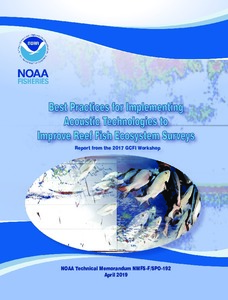| dc.contributor.author | Michaels, W.L. | |
| dc.contributor.author | Binder, B. | |
| dc.contributor.author | Boswell, K. | |
| dc.contributor.author | Chérubin, L.M. | |
| dc.contributor.author | Demer, D.A. | |
| dc.contributor.author | Jarvis, T. | |
| dc.contributor.author | Knudsen, F.R. | |
| dc.contributor.author | Lang, C. | |
| dc.contributor.author | Paramo, J.E. | |
| dc.contributor.author | Sullivan, P.J. | |
| dc.contributor.author | Lillo, S. | |
| dc.contributor.author | Taylor, J.C. | |
| dc.contributor.author | Thompson, C.H. | |
| dc.date.accessioned | 2020-04-11T22:48:20Z | |
| dc.date.available | 2020-04-11T22:48:20Z | |
| dc.date.issued | 2019 | |
| dc.identifier.citation | Michaels, W.L.; Binder, B.; Boswell, K.; Chérubin, L.M.; Demer, D.A.; Jarvis, T.; Knudsen, F.R.; Lang, C.;
Paramo, J.E.; Sullivan, P.J.; Lillo, S.; Taylor, J.C.; and Thompson, C.H. (2019) Best Practices for Implementing Acoustic Technologies to Improve Reef Fish Ecosystem Surveys: Report from the 2017 GCFI
Acoustics Workshop. Silver Spring, MD, NOAA National Marine Fisheries Service, 161pp. (NOAA Technical Memorandum NMFS-F/SPO-192) DOI: http://dx.doi.org/10.25607/OBP-787. | en_US |
| dc.identifier.uri | http://hdl.handle.net/11329/1272 | |
| dc.identifier.uri | http://dx.doi.org/10.25607/OBP-787 | |
| dc.description.abstract | Approximately 330 participants from 30 countries attended the 70th Gulf and Caribbean Fisheries Institute (GCFI) conference held in Merida, Mexico during 4-10 November 2017. The conference featured a symposium on Acoustic Technologies to Improve Reef Fish Ecosystem Surveys, whichprovided presentations on the various acoustic technologies used to monitor reef fish ecosystems. An acoustic workshop was also held to build scientific capacity and foster collaborative acoustic expertise, in order to enhance research and survey operations in reef-fish ecosystems. Recognizing the connectivity of marine populations across the geopolitical jurisdictions of the wider Caribbean region, National Oceanic and Atmospheric Administration (NOAA) supported the GCFI Ocean Innovation Strategic Initiative grant to build scientific capacity in the region for the sustainability of living marine resources. The acoustic workshop was conducted over three days with collaboration between GCFI, NOAA, Kongsberg-Simrad, Echoview and the South East Acoustic Consortium (SEAC). On the first day (November 4th), 33 participants and instructors from 10 countries departed from city of Progreso aboard the boat Isla Mujeresfor training on the use of three versions of the Simrad EK80 widebandechosounder: EK80 WBTs (designed for ships), EK80 WBAT (designed for autonomous platforms), and portable EK80 EcoSounder. Acoustic data was collected on a reef site approximately 18 miles offshore. During the second day (November 5th), participants received an overview of echosounder data processing and analytical methods using Echoview software, with a focus on reef environments. Participants learned how to load, calibrate and clean their acoustic data, how to detect, track and classify reef fish, and how to quantify their distribution and abundance. The third day of the acoustic workshop (November 9th) brought together the diverse perspectives of 57 participants from 13 countries to address the operational challenges of conducting acoustic surveys of reef-fish ecosystems. Case studies were presented by experts on various topics relevant to conducting acoustic operations in reef-fish habitats, such as statistical survey design, sensor selection and configuration, and interpreting acoustic data. Participants worked to prioritize management and operational objectives that can feasiblybe achieved with acoustic technologies in the region, and developed the framework for the technical report.This report provides guidance on the best practices for active- and passive-acoustic operations to enhance the understanding of reef-fish ecosystems. The acoustic workshop forged collaborative partnerships and provided direction for future training workshops on the integration of acoustic and optical technologies. These collaborative efforts are critical for building the next generation of experts, whose role will be to optimize survey operations with technologies for improving the sustainability of living-marine-resources in reef-fish ecosystems with connectivity across the geopolitical jurisdictions of the region. | en_US |
| dc.language.iso | en | en_US |
| dc.publisher | NOAA National Marine Fisheries Service | en_US |
| dc.relation.ispartofseries | NOAA Technical Memorandum;NMFS-F/SPO-192 | |
| dc.rights | CC0 1.0 Universal | * |
| dc.rights.uri | http://creativecommons.org/publicdomain/zero/1.0/ | * |
| dc.subject.other | Reef fish | en_US |
| dc.subject.other | Acoustic surveys | en_US |
| dc.subject.other | Fish ecosystems | en_US |
| dc.title | Best Practices for Implementing Acoustic Technologies to Improve Reef Fish Ecosystem Surveys: Report from the 2017 GCFI Acoustics Workshop. | en_US |
| dc.type | Report | en_US |
| dc.description.status | Published | en_US |
| dc.format.pages | 161pp. | en_US |
| dc.description.refereed | Refereed | en_US |
| dc.publisher.place | Silver Spring, MD | en_US |
| dc.subject.parameterDiscipline | Parameter Discipline::Biological oceanography::Fish | en_US |
| dc.subject.parameterDiscipline | Parameter Discipline::Biological oceanography::Rock and sediment biota | en_US |
| dc.subject.instrumentType | Instrument Type Vocabulary::acoustic backscatter sensors | en_US |
| dc.description.currentstatus | Current | en_US |
| dc.description.sdg | 14.2 | en_US |
| dc.description.eov | Fish abundance and distribution | en_US |
| dc.description.eov | Ocean sound | |
| dc.description.bptype | Best Practice | en_US |
| dc.description.bptype | Manual (incl. handbook, guide, cookbook etc) | en_US |
| obps.resourceurl.publisher | https://spo.nmfs.noaa.gov/tech-memos | en_US |
 Repository of community practices in Ocean Research, Applications and Data/Information Management
Repository of community practices in Ocean Research, Applications and Data/Information Management

